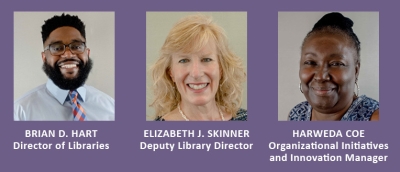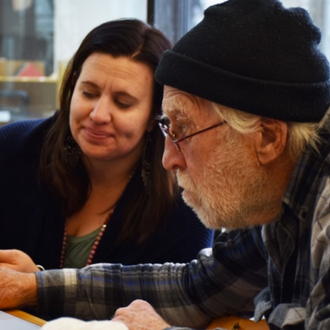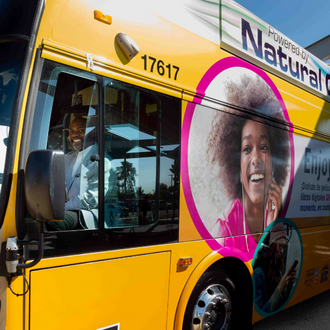Walking Alongside Forsyth County Customers on the Path to Digital Equity [Interview]

Q&A with Forsyth County Public Library's Brian D. Hart (Director of Libraries), Elizabeth J. Skinner (Deputy Library Director) and Harweda Coe (Organizational Initiatives and Innovation Manager)
Digital equity and inclusion are longstanding priorities for Forsyth County Public Library (N.C.), which provided the first public computer access in North Carolina in the early 80s, and has supported the county for over a decade through its Computer Training Bridge program. During COVID-19, FCPL has taken a leading role in meeting local digital needs through outreach, virtual programming and leveraging Digital Navigators.
ULC connected with FCPL's Brian D. Hart (Director of Libraries), Elizabeth J. Skinner (Deputy Library Director) and Harweda Coe (Organizational Initiatives and Innovation Manager) for a discussion of the library's digital inclusion and equity leadership. Read highlights from this conversation below.
Q: | How has the past year and a half changed the library’s understanding of local digital needs and your role in meeting those needs? What new strategies and partnerships have come out of this period? |
Brian D. Hart (Director of Libraries):
Having to navigate the past year of COVID-19 restrictions and social unrest as a library committed to community engagement, inclusion and lifelong learning has been particularly challenging. In an effort to address inequities during the pandemic, our bookmobile staff was among the first deployed back into the community as they began visiting impacted neighborhoods and shopping centers to offer wireless connectivity and materials to students and families who might have otherwise gone without.
Additionally, in the midst of the pandemic, the library began offering a wide array of digital programs and services, including an online library card that made all library materials, and particularly online resources, more accessible to all county residents. Our Computer Training Bridge (CTB) program began hosting online programs and trainings in small groups which enabled customers to received personalized assistance on topics of their choosing. Similarly, as we’ve begun ushering and welcoming customers back to receive in-person services and assistance, we’ve recently made Gale Udemy available to library customers as an extension of our already established CTB suite of programs.
Beyond these end-user strategies and services, the library has also become a more active participant and partner in the Forsyth County Digital Equity Steering Committee, which is exploring the lack of internet and computer access in low-income neighborhoods. Elizabeth Skinner serves on the committee as the library’s liaison. Being a part of such groups across the county helps us to become more intentional in our efforts to address digital divides while also broadening the library’s reach.
Elizabeth J. Skinner (Deputy Library Director):
FCPL has always placed a high priority on digital access for the public. We offered the first public computer access in the state of North Carolina through the Adult Continuing Education program at the Central Library in December 1981. From these two public computers, digital access grew through a grant from the Bill & Melinda Gates Foundation in 2001 when a Computer Learning Center was created at the Central Library and public computer access increased at the branch libraries.
Computer Training Bridge (CTB) is an award-winning program run in collaboration with WinstonNet to create community knowledge centers in churches and other community spaces that would offer computer access and training to individuals in under-resourced areas of the county. Volunteer trainers have played an important role in the success of computer classes taught at the Central Library, branch libraries and community knowledge centers. Classes have ranged from the “ABCD’s of Computers” to Microsoft Office Suite training. The library has also collaborated with the Urban League to employ paid computer trainers for the program. Before COVID-19, the library produced a monthly print calendar of weekly classes and provided an online CTB portal. During the pandemic, the CTB staff continued to offer training through Zoom, but no in-person training occurred.
Harweda Coe (Organizational Initiatives and Innovation Manager):
The Computer Training Bridge (CTB) is a free, curriculum-based library outreach program focused on promoting digital literacy in Forsyth County. It aims to provide learning opportunities for those in our community who need high-quality technology and computer literacy training to empower and prepare them to live in an electronic, networked, computer-based society.
The library has invested heavily in bridging the digital divide gap, and partnering with WinstonNet has helped reduce the gap. Through the WinstonNet partnership, CTB program provides training throughout 40 labs in the community, which consist of public libraries, recreation centers, churches and nonprofits. Seven of these labs are located within Place Matter Neighborhoods, and additional training is available through the library's bookmobiles.
The partnership expanded when the library and WinstonNet applied for a United Way Place Matters grant in 2017, called “Neighborhood Empower Through Technology” (NETT). The grant addressed the economic, educational and life skills of residents in a predetermined ZIP code. The program's goal was to provide customers with basic computer skills to build on their educational background, career development and life skills. Customers who completed a free 30-hour program were eligible for a low-cost laptop, and the library provided additional computer training to help the customers expand their skills. CTB offered 5,393 programs with 10,468 participants in 2019. The key program strategy includes a volunteer-based, train-the-trainer approach and a computer coach to assist with training classes.
Q: | During May 2021, Forsyth County Public Library partnered with the State Library of North Carolina to meet the digital needs of community members using the Digital Navigators service model. How does this partnership align with, and extend, the library’s existing efforts and priorities for meeting local digital needs? |
Brian D. Hart (Director of Libraries):
The partnership with the State Library’s Digital Navigators program aligns perfectly with FCPL’s approach to digital inclusion as we regularly host technology trainings in settings and on a variety of topics that respond directly to the needs, interests and varied learning styles of our users. Further, the concept of Digital Navigators resonates with us because we – as a library – want to work and walk alongside our customers and community on the path towards digital equity, knowing that as they learn we also learn how to be of better service to them and their unique challenges.
Elizabeth J. Skinner (Deputy Library Director):
One key role that FCPL has reclaimed in opening the doors of our 10 library locations is that of teaching in the use of technology. To be certain, nearly every front-line staff – from librarians to library assistants to library tech pages – assist customers with integrating library technology with their devices, including laptops, iPads/tablets and smartphones.
From accessing the library’s downloadable collection through the Libby App, to searching library databases or attending a virtual program, library staff members are always on the front lines to help. Additionally, every library location offers public computer access where individuals can search for employment, apply for jobs and develop resumes. While the Digital Navigators and CTB staff can offer assistance virtually, front-line staff do this in person. All three of these services support each other.
Harweda Coe (Organizational Initiatives and Innovation Manager):
The library assisted with the Digital Navigators initiative in promoting the program to Forsyth County residents. The library promoted the program on Facebook, Instagram, local newspapers, the library’s website and the library’s in-branch digital display boards. The goal of the Digital Navigators program was to help people with questions on computer skills and how to use their digital devices. Customers contacted the navigators through a helpline that ran for one month.
Frequently, our Digital Navigators Helpline participants wanted to discuss connectivity options in rural areas with limited internet availability. Participants were directed to the Broadband Infrastructure Office survey. For Forsyth County residents, the library partnered with Neighborhoods Empower Through Technology (NETT) and offered low-cost broadband to residents.
Q: | What advice do you have for other library systems who are looking into opportunities to launch or build on programs that offer one-on-one digital service, like the Digital Navigators or Computer Training Bridge programs? |
Brian D. Hart (Director of Libraries):
Be intentional about learning the needs of your community, library users and other community agencies with similar priorities. Offering programs and services that resonate with customers or correlate with other community priorities is a good practice to ensure a positive return on investment.
Elizabeth J. Skinner (Deputy Library Director):
- Research what technology is already being offered in the community through programs such as Goodwill and the local community college, and reach out for partnership opportunities.
- Investigate LSTA opportunities to launch technology programs in your library. Do your research and understand what your state library agency has supported in libraries across your state.
- Study the demographics of your community to understand under-resourced areas. Focus on those areas and look for potential partners who are working with those communities.
- Promote online training resources such as Tutor.com and Udemy available through the library.
Q: | Building staff and volunteer data fluency – their confidence and capacity to use data effectively – is foundational for effective leadership in digital equity and technological inclusion. How is the library leveraging data and helping team members build data fluency in order to expand your reach and impact? |
Brian D. Hart (Director of Libraries):
The library is working with local organizations and other county departments such as MapForsyth to help us identify and stay abreast of trends and needs within our community and service area. MapForsyth has developed a dashboard for the library which allows us to view and analyze data (languages spoken, technology access, food disparities, media consumption, etc.) so that we’re intentional about the types of programs and services we implement at one library location versus another. It will likely also be instrumental in helping us to identify growth in areas to help advocate for and plan future library locations, or renovations to existing locations.
Harweda Coe (Organizational Initiatives and Innovation Manager):
The Edge initiative has been an important resource for the library. The library conducted its first Edge Assessment in 2013. The results made the library aware of areas that needed improvements, such as broadband, assistive technology and video editing. Using the Edge Assessment results, several issues were addressed by the county IT department and the library, such as increasing access to broadband and video editing. The Edge Assessment results have also been used in several grant applications. A profile of Forsyth County Public Library's use of Edge is available here.
Related Articles

Leading Digital Inclusion in Salt Lake City: Interview with SLCPL's Peter Bromberg
Salt Lake City Public Library
ULC reached out to SLCPL's Executive Director Peter Bromberg to discuss Salt Lake City's unique digital inclusion needs and how the library is leading efforts to strengthen its communities in the digital age. Read the full interview below!
Learn More

Inviting the Uninvited: An Unconventional Partnership Helps Bridge the Digital Divide
Las Vegas-Clark County Library District
Through a new partnership, Las Vegas-Clark County Library District (LVCCLD) took steps to provide easy access for discovery, enjoyment and remote learning outside of the library walls and beyond the library website.
